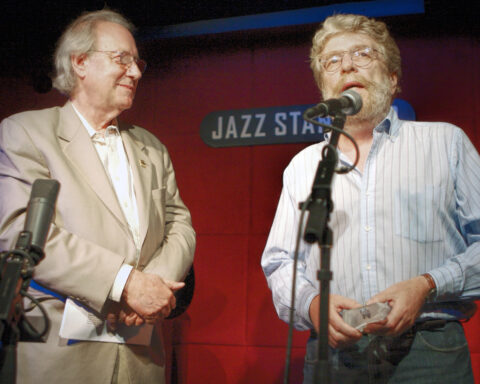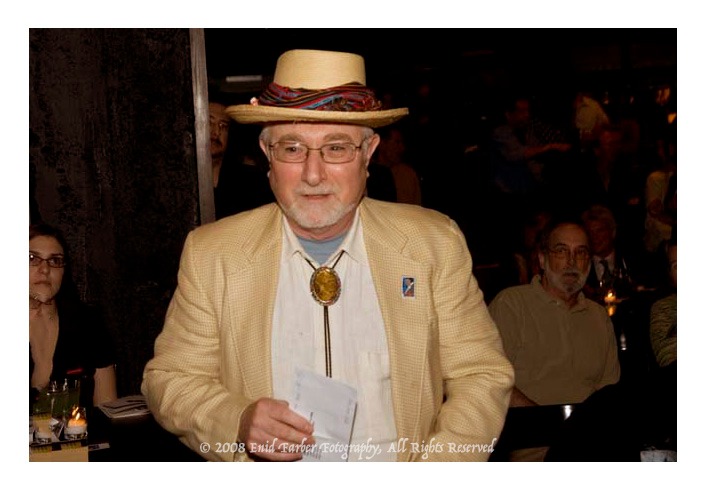The Nat Hentoff Memorial at St. Peter’s Church Friday, Feb 24, attested to the many facets of the civil libertarian and tireless jazz advocate, 1925-2017. He was a giant, and beyond category, to invoke the Ellington expression Hentoff applied to anyone he deemed deserving of it, and there weren’t many. He certainly lived up to the pronouncement himself — perhaps unique as a Jewish atheist civil libertarian pro-lifer.
Ellington expression Hentoff applied to anyone he deemed deserving of it, and there weren’t many. He certainly lived up to the pronouncement himself — perhaps unique as a Jewish atheist civil libertarian pro-lifer.
 Ellington expression Hentoff applied to anyone he deemed deserving of it, and there weren’t many. He certainly lived up to the pronouncement himself — perhaps unique as a Jewish atheist civil libertarian pro-lifer.
Ellington expression Hentoff applied to anyone he deemed deserving of it, and there weren’t many. He certainly lived up to the pronouncement himself — perhaps unique as a Jewish atheist civil libertarian pro-lifer.The Hentoff family gave a moving tribute, as did Randy Weston, whose solo piano performance of “Berkshire Blues” recalled the time he and Nat spent together at the Music Inn, where they talked, Weston said, about freedom. George Wein spoke movingly of his friendship with Hentoff, which went back to the ’40s. It was Hentoff who named Storyville, and whose approbation Wein craved the most. Hentoff spoke freely whether he approved of Wein’s work or not, and finally getting Hentoff’s stamp of approval meant a great deal to him. Often, when Wein called him for dinner, Hentoff’s response was terse: “I’m on deadline.”
Hentoff was as dedicated to defending civil liberties as he was to championing jazz. One of the conditions he named for joining the fledgling Village Voice was that he not be restricted to writing solely on jazz, and speakers on a panel paid tribute to his breadth of passions. Civil liberties activist Michael Meyers, longtime Voice colleague Tom Robbins, Dan Morgenstern, documentarian David Lewis (director of Hentoff documentary “The Pleasures of Being Out of Step”), pianist Joe Alterman and constitutional scholar John Whitehead all paid homage to the man who changed their lives via his multi-hyphenate career as record producer, novelist, columnist, activist and radio host. Of course, Hentoff changed a lot of people’s lives along the way — from Charles Mingus, to those he called on fact-checking missions, and those who called the number humbly listed at the bottom of his columns. The church was full of many of those people.
Hentoff was always surprised when anyone knew his name, but he was a towering figure, whether you agreed with him or not. He was read and respected worldwide. His commitment to journalism was legendary, as was his chutzpah. I interviewed him once, in 2010, for an article in The New York Times surrounding his 85th birthday and the recent publication of his 35th book, At the Jazz Band Ball. When I arrived at his West Village apartment to take the photo, I found him hunched over his IBM Selectric — he was a Luddite to the end — dressed entirely in sweats. I politely asked if he wanted to change into something more formal, but he declined, even for the Times. His response was memorable: “Just take the photo,” he said. “I’m on deadline.”
He thought, somewhat in jest, that he would be remembered most for his liner notes, which form an estimable body of work in their own right, but he did so much more, especially for the musicians themselves. One of Hentoff’s personal career highlights was his co-production (along with Robert Herridge and Whitney Balliett) of the 1957 CBS documentary “The Sound of Jazz,” in which he organized a reunion of Lester Young and Billie Holiday. It was a fitting close to the memorial service that it ended with a second line.





